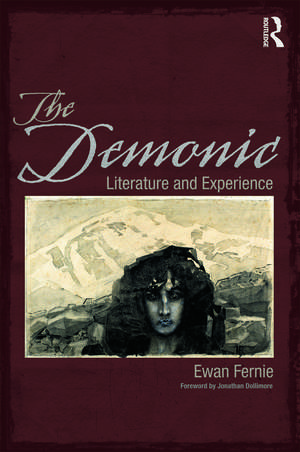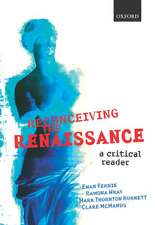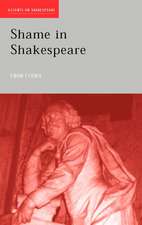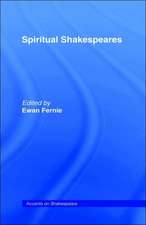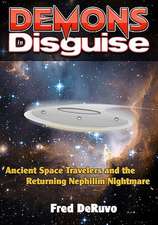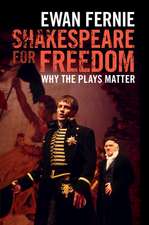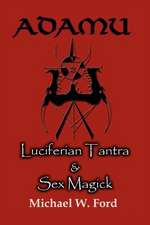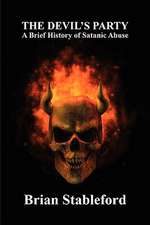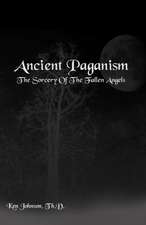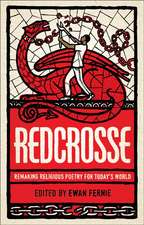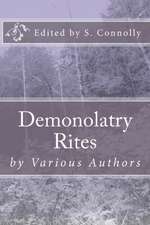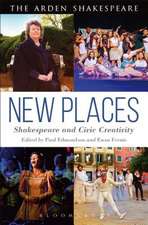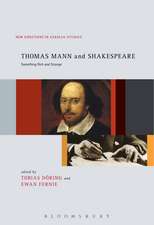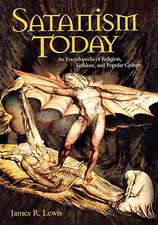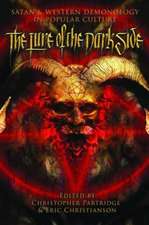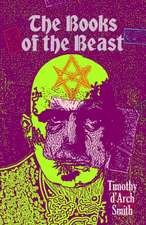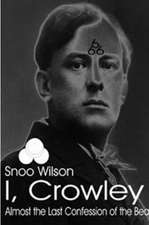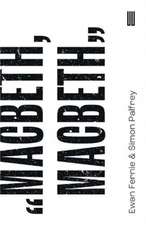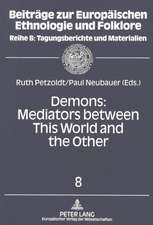The Demonic: Literature and Experience
Autor Ewan Fernieen Limba Engleză Paperback – 8 noi 2012
Ewan Fernie argues that the demonic tradition in literature offers a key to our most agonised and intimate experiences. The Demonic ranges across the breadth of Western culture, engaging with writers as central and various as Luther, Shakespeare, Hegel, Dostoevsky, Melville and Mann.
A powerful foreword by Jonathan Dollimore brings out its implications as an intellectual and stylistic breakthrough into new ways of writing criticism. Fernie unfolds an intense and personal vision, not just of Western modernity, but of identity, morality and sex. As much as it’s concerned with the great works, this is a book about life.
| Toate formatele și edițiile | Preț | Express |
|---|---|---|
| Paperback (1) | 372.62 lei 6-8 săpt. | |
| Taylor & Francis – 8 noi 2012 | 372.62 lei 6-8 săpt. | |
| Hardback (1) | 770.09 lei 6-8 săpt. | |
| Taylor & Francis – 8 noi 2012 | 770.09 lei 6-8 săpt. |
Preț: 372.62 lei
Nou
Puncte Express: 559
Preț estimativ în valută:
71.30€ • 74.64$ • 58.100£
71.30€ • 74.64$ • 58.100£
Carte tipărită la comandă
Livrare economică 05-19 aprilie
Preluare comenzi: 021 569.72.76
Specificații
ISBN-13: 9780415690256
ISBN-10: 0415690250
Pagini: 336
Ilustrații: 10 black & white halftones
Dimensiuni: 156 x 234 x 20 mm
Greutate: 0.52 kg
Ediția:New.
Editura: Taylor & Francis
Colecția Routledge
Locul publicării:Oxford, United Kingdom
ISBN-10: 0415690250
Pagini: 336
Ilustrații: 10 black & white halftones
Dimensiuni: 156 x 234 x 20 mm
Greutate: 0.52 kg
Ediția:New.
Editura: Taylor & Francis
Colecția Routledge
Locul publicării:Oxford, United Kingdom
Cuprins
Part One: Demonic Negativity 1. Dark Night of the Soul 2. Luther: Man between God and the Devil 3. Marlowe’s Doctor Faustus 4. Demonic Macbeth 5. Satan (and Demonic Sex) 6. A Justified Sinner 7. Dostoevsky’s Demons 8. Thomas Mann as Dr Faustus (via Love’s Labour’s Lost) 9. She Devil 10. Loving the Alien Part Two: Turnabout and Dialectic 11. Kierkegaard Trembling 12. Nietzsche: A Demon that Laughs 13. The Marriage of Heaven and Hell 14. Demonic Dialectic: Boehme, Schelling, Hegel Part Three: Possession 15. Introduction A. The Agony in Possessing 16. Angelo 17. Claggart 18. Possessing a Child 19. Possessive God 20. Christ the Possessor B. The Possessed 21. Introduction 22. Donne 23. Poor Tom 24. A Freudian Interruption 25. The Devils of Loudon 26. Jane Lead 27. The Master of Petersburg 28. Schreber
Notă biografică
Ewan Fernie is Professor of Shakespeare Studies at the Shakespeare Institute, University of Birmingham, author of Shame in Shakespeare, and joint General Editor of the Shakespeare Now! series. Redcrosse, his latest, collaborative project, is a new poetic liturgy for St George's Day, which has been performed in major cathedrals and by the RSC, and a book published in 2012.
Recenzii
"…mind-blowingly insightful… I cannot recommend the book enough!" - Huffington Post
"Fernie offers an uncommonly inviting study that readers can sink their discriminating teeth into with gusto. He presents an irresistible, meticulously prepared, expertly executed, and aesthetic smorgasbord in the form of one savory reading after another of assorted literary texts… Highly recommended." -CHOICE
"This is a profoundly important book. It addresses some of the hardest moral and theological questions we encounter in our struggles to understand literature and life... We need more of this kind of criticism." - Literature and Theology
"Fernie's remarkable book is itself all of these: rich, disturbing and personal - it may, indeed, be more than a little tinged with the demonic. The field of literature dealing with the demonic is vast and varied, and Fernie's wide-ranging exploration does not shrink back from the extent of its material.... The trajectory of Fernie's argument is eclectic in the best possible way where every transition is motivated and matters. The book is overwhelming, though not because of its staggering scope, but because of the originality of its argument and the sheer boldness of Fernie's readings.... Often colloquial, at times very funny indeed.... It is a challenge in the best possible sense, and it is an immensely gratifying read." -Shakespeare Jahrbuch
"The book blasts away at inherent contradictions that traditional theology and social values try to protect unscathed from critical scrutiny. This is what makes this book so vital to our time, probably one of the most important books of literary criticism to come out in recent years.... [T]his is a book that connects the craft of critical thought to the real experience of our lives.... Fernie’s Demonic is a journey we should all take. We will not be the same at the end."--Cahiers Élisabéthains
"Literature and Experience? Ewan Fernie's subtitle will alarm literary scholars who have taken in with their mother's milk the doxa that the study of literature should as far as possible be objective and dispassionate, cordoned off from experience (at least, that of the reader-Historical experience is another matter.) But the bold claim of this book is precisely that professional students of literature should have the pluck to engage with literary texts in an undefended, unapologetically personal, way-should lay themselves open to texts, allowing themselves to be possessed, and disturbed, by their power... the demonic is for Fernie a way of recognizing a constitutive, but profoundly ambivalent, feature of human experience, namely our species' 'potential for creativity over against what merely is'... Macbeth is a central text, though it's hardly alone: one of the most impressive features of the book is the sheer range of authors Fernie manages to recruit to the Devil's party... this is for me one of the most bracing and spirited books of literary criticism of recent years; we need more such attempts to reconnect literature with life." - The Review of English Studies
"Fernie's interpretative scope reminds one of Erich Auerbach or George Steiner. His philosophical scrutiny is at the same time daring and exigent, conscientious and refined. Interpretations of Macbeth and Paradise Lost, along with those that follow of Dostoevsky's Demons and Thomas Mann's Doctor Faustus, stand out as a book within a book. As in a natural vortex, our attention is whirled to the bottom of the problem and, after a memorable experience, released back to the academic decorum of reading literary criticism. An impressive accomplishment! Throughout the book one feels disturbed by literature and responsible to experience. The Demonic seems to have been written with the Kierkegaardian intention to keep 'the wound of negativity' open and with a refusal to derive 'positive, cosy joy from life." - Belgrade Bells
"Provocative and profound – a thrilling and radical account of the allure of the demon in us all." - Salley Vickers, author of Miss Garnet’s Angel
"Ewan Fernie's study of the demonic in canonical literature is an original and exciting work of scholarship. Beautifully written, and continuously engaging, this book surprises the reader at almost every turn with insights into literature that remain in the mind and change how we think of poems and narratives we thought we knew well." - Kevin Hart, Edwin B. Kyle Professor of Christian Studies at the University of Virginia, USA
"That the word "evil" contains within itself the word "live" is merely a lexical accident, but that the demonic might yet reveal what it means to truly or finally live is the profound mystery at the heart of Ewan Fernie's book, which, in brilliantly ranging right across the Western literary canon, succeeds in alerting us to the sheer vitality in our cultural inheritance of demonic experience, or what Fernie calls the "life that is opposed to life". And in this life-against-life Fernie finds or senses a way of being-in-the-world that we might not only dare to call truly human but even, perhaps and paradoxically, good or divine." - John Schad, Professor of Modern Literature at the University of Lancaster, UK
"With dazzling range and depth, Ewan Fernie has tackled a subject that we ignore at our peril: the demonic. He not only mines cultural resources—from Luther to Kierkegaard, from Marlowe to Dostoevsky, from Nietzsche to Schreber—to examine the experience of the demonic, but more: with his compelling prose, Fernie manages to create the experience of the demonic for us. This is not a book for the faint of heart. It reveals the relationship of the demonic to contemporary thought on negativity, to the darkness of possession, and to the transcendence of the sacred, showing that 'sainthood is perilously close to damnation'. This book immeasurably enhances our understanding of the problem of evil." - Regina M. Schwartz, Professor of English and Law, Northwestern University, USA
"The Demonic: Literature & Experience is a bold, trailblazing book of formidable intellectual scope and ethical intensity. Through radical reappraisals of masterpieces by Shakespeare, Milton, Goethe, Dostoevsky and Mann, and through dialogues with thinkers as diverse as Luther, Hegel, Nietzsche, Kierkegaard and Freud, it reveals the demonic as a vital force in our daily lives that we disavow to our cost. A passionate, seductive defence of the dark side by a critic committed to making literature matter." - Kiernan Ryan, Professor of English Language & Literature, Royal Holloway, University of London, UK
"Fernie offers an uncommonly inviting study that readers can sink their discriminating teeth into with gusto. He presents an irresistible, meticulously prepared, expertly executed, and aesthetic smorgasbord in the form of one savory reading after another of assorted literary texts… Highly recommended." -CHOICE
"This is a profoundly important book. It addresses some of the hardest moral and theological questions we encounter in our struggles to understand literature and life... We need more of this kind of criticism." - Literature and Theology
"Fernie's remarkable book is itself all of these: rich, disturbing and personal - it may, indeed, be more than a little tinged with the demonic. The field of literature dealing with the demonic is vast and varied, and Fernie's wide-ranging exploration does not shrink back from the extent of its material.... The trajectory of Fernie's argument is eclectic in the best possible way where every transition is motivated and matters. The book is overwhelming, though not because of its staggering scope, but because of the originality of its argument and the sheer boldness of Fernie's readings.... Often colloquial, at times very funny indeed.... It is a challenge in the best possible sense, and it is an immensely gratifying read." -Shakespeare Jahrbuch
"The book blasts away at inherent contradictions that traditional theology and social values try to protect unscathed from critical scrutiny. This is what makes this book so vital to our time, probably one of the most important books of literary criticism to come out in recent years.... [T]his is a book that connects the craft of critical thought to the real experience of our lives.... Fernie’s Demonic is a journey we should all take. We will not be the same at the end."--Cahiers Élisabéthains
"Literature and Experience? Ewan Fernie's subtitle will alarm literary scholars who have taken in with their mother's milk the doxa that the study of literature should as far as possible be objective and dispassionate, cordoned off from experience (at least, that of the reader-Historical experience is another matter.) But the bold claim of this book is precisely that professional students of literature should have the pluck to engage with literary texts in an undefended, unapologetically personal, way-should lay themselves open to texts, allowing themselves to be possessed, and disturbed, by their power... the demonic is for Fernie a way of recognizing a constitutive, but profoundly ambivalent, feature of human experience, namely our species' 'potential for creativity over against what merely is'... Macbeth is a central text, though it's hardly alone: one of the most impressive features of the book is the sheer range of authors Fernie manages to recruit to the Devil's party... this is for me one of the most bracing and spirited books of literary criticism of recent years; we need more such attempts to reconnect literature with life." - The Review of English Studies
"Fernie's interpretative scope reminds one of Erich Auerbach or George Steiner. His philosophical scrutiny is at the same time daring and exigent, conscientious and refined. Interpretations of Macbeth and Paradise Lost, along with those that follow of Dostoevsky's Demons and Thomas Mann's Doctor Faustus, stand out as a book within a book. As in a natural vortex, our attention is whirled to the bottom of the problem and, after a memorable experience, released back to the academic decorum of reading literary criticism. An impressive accomplishment! Throughout the book one feels disturbed by literature and responsible to experience. The Demonic seems to have been written with the Kierkegaardian intention to keep 'the wound of negativity' open and with a refusal to derive 'positive, cosy joy from life." - Belgrade Bells
"Provocative and profound – a thrilling and radical account of the allure of the demon in us all." - Salley Vickers, author of Miss Garnet’s Angel
"Ewan Fernie's study of the demonic in canonical literature is an original and exciting work of scholarship. Beautifully written, and continuously engaging, this book surprises the reader at almost every turn with insights into literature that remain in the mind and change how we think of poems and narratives we thought we knew well." - Kevin Hart, Edwin B. Kyle Professor of Christian Studies at the University of Virginia, USA
"That the word "evil" contains within itself the word "live" is merely a lexical accident, but that the demonic might yet reveal what it means to truly or finally live is the profound mystery at the heart of Ewan Fernie's book, which, in brilliantly ranging right across the Western literary canon, succeeds in alerting us to the sheer vitality in our cultural inheritance of demonic experience, or what Fernie calls the "life that is opposed to life". And in this life-against-life Fernie finds or senses a way of being-in-the-world that we might not only dare to call truly human but even, perhaps and paradoxically, good or divine." - John Schad, Professor of Modern Literature at the University of Lancaster, UK
"With dazzling range and depth, Ewan Fernie has tackled a subject that we ignore at our peril: the demonic. He not only mines cultural resources—from Luther to Kierkegaard, from Marlowe to Dostoevsky, from Nietzsche to Schreber—to examine the experience of the demonic, but more: with his compelling prose, Fernie manages to create the experience of the demonic for us. This is not a book for the faint of heart. It reveals the relationship of the demonic to contemporary thought on negativity, to the darkness of possession, and to the transcendence of the sacred, showing that 'sainthood is perilously close to damnation'. This book immeasurably enhances our understanding of the problem of evil." - Regina M. Schwartz, Professor of English and Law, Northwestern University, USA
"The Demonic: Literature & Experience is a bold, trailblazing book of formidable intellectual scope and ethical intensity. Through radical reappraisals of masterpieces by Shakespeare, Milton, Goethe, Dostoevsky and Mann, and through dialogues with thinkers as diverse as Luther, Hegel, Nietzsche, Kierkegaard and Freud, it reveals the demonic as a vital force in our daily lives that we disavow to our cost. A passionate, seductive defence of the dark side by a critic committed to making literature matter." - Kiernan Ryan, Professor of English Language & Literature, Royal Holloway, University of London, UK
Descriere
Ewan Fernie argues that the demonic tradition in literature offers a key to our most agonised and intimate experiences. The Demonic ranges across the breadth of Western culture, engaging with writers as central and various as Luther, Shakespeare, Hegel, Dostoevsky, Melville and Mann.
